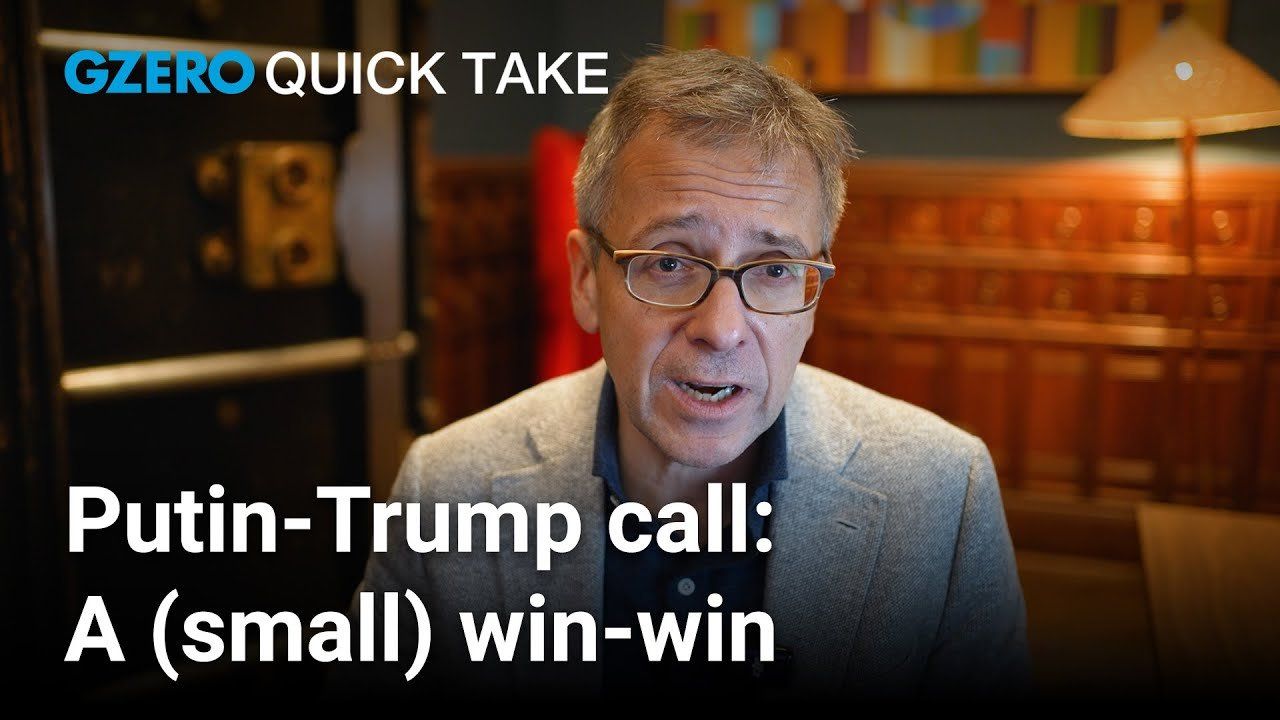March 18, 2025
Ian Bremmer's Quick Take: The Putin-Trump call, some 90 minutes long, now over. And I would call this a win for both sides, for the Americans and the Russians, and not horrible for Ukraine and Europe, but kicking the can on what's going to be some big problems down the road and setting out where those challenges are going to be. Why is that?
Well, first of all, Putin said, "No," to the 30-day complete ceasefire, but did give a win to Trump, having accepted a 30-day ceasefire with no conditions with the Ukrainians. The Russians are saying they're prepared to do that, with no gives, as long as it's about targeting energy infrastructure, and in principle, still some discussions around maritime attacks around the Black Sea. Places that frankly the Russians have been irritated with what Ukraine has been able to do with air drones and with sea drones. And also allows the Russians to continue to press for territorial gains over the course of the coming weeks, depleting Ukraine's military capabilities. Plus, the weather's getting warmer, how much damage are you going to do to Ukraine, how miserable you can make them when you're no longer dealing with the freeze is not quite as relevant. So, not a particular loss for the Russians.
The fact that you're going to have less engagement militarily means fewer people will get killed. That's good for everybody involved, frankly. So that's where we are. Did you need 90-minutes to get that going? Not really, because the Russians also want to ensure that they have lots of conversations with the Americans about building business between the two sides, about people-to-people engagement, about finding a way to ensure that there is an ongoing bilateral channel where the Europeans aren't involved, where the Ukrainians aren't involved, that's essential for Putin and that he got. So yes, you have a meaningful, relatively contained ceasefire that maybe you can build on, but you also have a meaningful bilateral channel for broader engagement between the Americans and the Russians that the Ukrainians and the Europeans aren't going to be a part of, and that the Americans have no interest in having the Ukrainians Europeans being a part of.
Now, what Trump has heard from Putin in terms of red lines is that to actually have a comprehensive ceasefire ongoing, that the Russians are demanding, that there is no further intelligence or military support to Ukraine from the United States or Europe. That's obviously a non-starter for the Ukrainians because it means they won't be able to defend themselves as the Russians rebuild. It's a non-starter for the Europeans for similar reasons. Trump might be willing to negotiate that, and if he is, then he and Putin can blame Ukraine and the Europeans for not being able to take a 30-day limited ceasefire and expand it, which is exactly the position that Putin wants to be in. So, Putin giving a little bit in the near-term with the hopes of getting a lot more in the longer-term, getting Trump as it were, a little bit pregnant around a deal so that he's more engaged with the Russians in areas that's going to be more consequential and more costly for Europe and for the Ukrainians.
So that's where we are. We don't know yet whether the Ukrainians are going to accept these limited 30-day terms. I expect they will, because Trump wants them to. And when that happens, the Europeans will be onboard, too. The intention will be to try to use that by the Ukrainians, the Europeans, to try to get a longer, broader ceasefire. But there, the working level conversations between the US and Russia, between the US and Ukraine, are going to be far more difficult and they're probably not going to hold.
It feels a little bit like what we have in Gaza. Relatively easy to get the first iteration of a deal in place where no one's really giving anything up, but as you go into the second phase, you find that the fundamental interests don't actually overlap, and that's why we're fighting again on the ground in Gaza, with the Israelis killing hundreds of people there in the last 24-hours, and it's why I expect ultimately we are not heading towards peace, even though we do get a temporary ceasefire with Ukraine.
More For You
Ukraine's President Volodymyr Zelenskiy, Finland's President Alexander Stubb, Estonia’s Prime Minister, President of the European Commission Ursula von der Leyen and other European leaders visit memorial to fallen Ukrainian defenders at the Independent Square on the fourth anniversary of Russia's full-scale invasion, in Kyiv, Ukraine February 24, 2026.
Ukrainian Presidential Press Service/Handout via REUTERS
Somewhere in the Donbas region, Ukrainian soldier Artem Bondarenko says he hasn’t slept through the night in months as he defends Eastern Ukraine.
Most Popular
Members of the special units of the National Guard and the Secretaria de Seguridad Ciudadana stand guard in front of the Fiscalia General de la Republica, where the investigation into the operation in which Nemesio Oseguera Cervantes, alias "El Mencho", founder and leading head of the Cartel de Jalisco Nueva, was killed, is underway.
Félix Márquez/dpa via Reuters Connect
- YouTube
In this Quick Take, Ian Bremmer warns that US military strikes on Iran are “looking increasingly imminent” as diplomacy appears to stall.
© 2025 GZERO Media. All Rights Reserved | A Eurasia Group media company.
